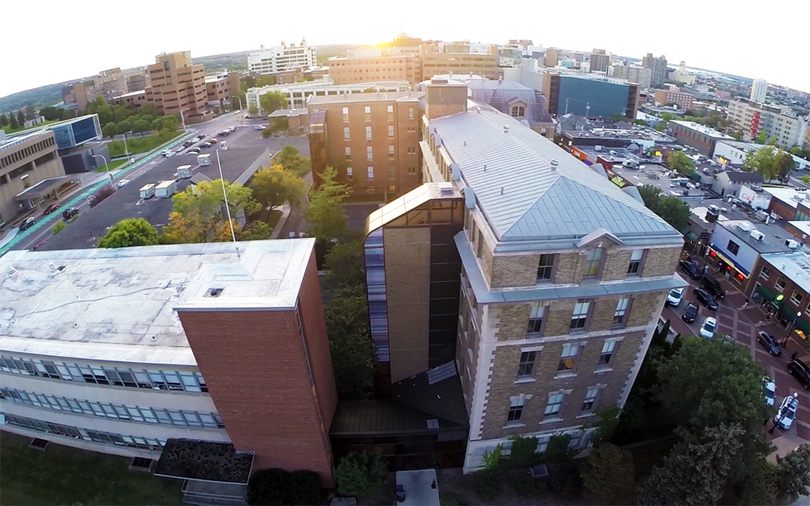School of Education to use largest grant in its history to support InclusiveU

The School of Education, which is located in Huntington Hall, received the largest grant in the school's history. The money will be used for the InclusiveU program. Chase Guttman / Asst. Photo Editor
The largest donation in School of Education history will be used to support people with disabilities.
The $3 million gift, donated by the Taishoff Family Foundation, was recently given to the Lawrence B. Taishoff Center for Inclusive Higher Education to promote InclusiveU, a program aimed at supporting students with intellectual and developmental disabilities. The money will be allocated in different amounts over the next three years. The action plan for using the money will be completed in a span of five years.
The Lawrence B. Taishoff Center was established in 2009 when the Taishoff Family Foundation gave a little more than $1 million to the School of Education, said Beth Myers, interim director of the center.
One large focus of the gift money is to allow the non-matriculated students in the InclusiveU program to live in on-campus housing. Currently all of the members in the program have been commuter students who live in the Syracuse area.
“We’re planning to improve and expand that collaboration with two other school districts in the area,” Myers said.

With the option of on-campus housing available for students, InclusiveU hopes to become a prestigious program that accepts applications not only from students in the upstate New York area, but also from potential students all over the United States, Myers said.
“This kind of higher education experience is accessible to people in a way it has never been before,” she said.
In order to graduate in the certificate program offered by InclusiveU, students must take five classes from University College in a certain area of study, Myers said. The students will also graduate with employment and internship experience.
The Lawrence B. Taishoff Center is bringing students with disabilities opportunities to be a part of higher education, said Heather Waters, assistant dean for advancement at the School of Education. Waters added that this makes the university better, not just the individual.
People are waking up to the idea that it’s not that (people with disabilities) aren’t able to do anything, they are just different and they have a lot to offer.Heather Waters
Twelve students are accepted into the four-year program in InclusiveU each year. Last year was the pilot year for the program, Joanna Masingila, dean of the School of Education, said.
Terry Brown, executive director of the Falcone Center for Entrepreneurship at the Martin J. Whitman School of Management, and graduate students in Whitman created the business plan that outlined the next phase of growth of InclusiveU and what it would cost, Masingila said.
After Brown and the graduate students finished the plan last semester, Masingila met with Chancellor Kent Syverud and briefed him on the plan. She said the chancellor was the one who asked for the donation from the Taishoff Family Foundation.
In a meeting with officials from the School of Education and the Office of Residence Life on Sept. 16, a working group was created to discuss how students in InclusiveU will live in residence halls by 2017, Masingila said.
Members of the working group will be chosen by mid-October by members of the Office of Residence Life and the Lawrence B. Taishoff Center.

One other aspect of InclusiveU that the gift will fund is Project SEARCH — an internship program that places students at sites where they are interested in working. With the plan of starting the internship program in the spring 2016 semester, the School of Education hired a new employee to direct the program.
The Peer-to-Peer Project, a program designed to pair SU matriculated students with non-matriculated students with disabilities, is another part of InclusiveU.
The program, which currently has the largest group of members since it began, will be funded entirely with the gift money.
Asia Walker, a former peer partner in the Peer-to-Peer Project, said having good friends was the best part of being in the program last year.
“I just like having nice people around — to get friendship,” Walker said.




